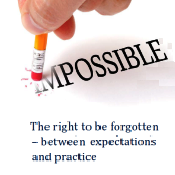To conclude this Leo's previous post, here are the four or five thoughts on his mind.
(1) Is the decision worthwhile?
Well, as you may have already seen various reports on this matter: the reaction is mixed. The CJEU’s judgment is welcomed because it formally confirms (or preempts this) that there is a right to suppress personal information -which serves no public good. [Right to privacy is the fundamental human right addressed by this decision. Articles 7 and 8 of the Charter of Fundamental Rights of the European Union ("Charter") connect with and/or expand Article 8 of the European Convention on Human Rights ("ECHR")]
This Leo’s initial concern was that the decision could potentially jeopardise anti-corruption and other transparency efforts in public office. Now, Google has given an indication that malfeasance in public office won’t find it easy.
Many will argue, rightly, that the decision offers little or no help at all if the source of information remains alive; or if it can be seen in search results outside the EU, or using Google’s .com domain within the EU.[Google says that it may notify the source with its decision. One will be lucky if the source can finish it off]
Anyway, in hindsight, it feels as if Google was already doing something similar, before this decision, with the Webmaster URL Removal Tool. [Afro Leo wonders whether the 'right to be forgotten' form should now supersede all forms]
(1) Is the decision worthwhile?
Well, as you may have already seen various reports on this matter: the reaction is mixed. The CJEU’s judgment is welcomed because it formally confirms (or preempts this) that there is a right to suppress personal information -which serves no public good. [Right to privacy is the fundamental human right addressed by this decision. Articles 7 and 8 of the Charter of Fundamental Rights of the European Union ("Charter") connect with and/or expand Article 8 of the European Convention on Human Rights ("ECHR")]
This Leo’s initial concern was that the decision could potentially jeopardise anti-corruption and other transparency efforts in public office. Now, Google has given an indication that malfeasance in public office won’t find it easy.
 |
| Source: here |
Many will argue, rightly, that the decision offers little or no help at all if the source of information remains alive; or if it can be seen in search results outside the EU, or using Google’s .com domain within the EU.[Google says that it may notify the source with its decision. One will be lucky if the source can finish it off]
Anyway, in hindsight, it feels as if Google was already doing something similar, before this decision, with the Webmaster URL Removal Tool. [Afro Leo wonders whether the 'right to be forgotten' form should now supersede all forms]
(2) African countries might follow
Similar to online copyright protection and enforcement, data protection and privacy is now becoming increasingly topical across the world (e.g. see here and here). This Leo understands that South Africa’s Protection of Personal Information Act (“POPIA”) may well be interpreted to cover the ‘right to be forgotten’ concept (thanks to Europe). Other African countries, e.g. Nigeria, might follow suit. To his mind, developing countries should tread carefully, unless they have the appropriate structures in place to minimise abuse or censorship of public interest information. There is still need to build stronger governance structures and civil society. [Says Afro Leo: "the African continent seems to be ahead in a few things; 'leapfrogging', as some would say here, here, and here"]
(3) (i) Who is covered by this decision?
Please select the country whose law applies to your request*
 |
| Source: here |
This curiosity is compounded by reports (e.g. here, here, and here), perhaps unintentionally, using ‘Europeans’ and ‘EU citizens’ as if the right conferred by the CJEU’s decision is exclusive. This Leo isn't
As we currently have it, the ECHR and Charter ("human rights laws") apply to the bloc (the UK domesticating the ECHR via the Human Rights Act 1998). The human rights laws (including decisions of the CJEU or ECtHR) cover everyone in the UK regardless of their citizenship or immigration status and can be invoked before a public authority in the UK. The same is expected to also apply in other EU Member States. [Afro Leo also points to the inclusive language in the Charter such as 'everyone' and 'peoples of Europe'] As always, this Leo gladly welcomes comments and corrections
Apparently, companies may be able rely on certain or most parts of the human rights laws. Right to be forgotten could be a different kettle of fish in regards to companies. Imagine this: A company fined by a regulator, 10 years ago for a minor breach, now seeks to remove links to the news reports on the grounds that it is 'outdated'. Fair enough? Anyway, to learn more about companies and human rights laws, see here, here, here, here, and here. [Afro Leo thinks that if this is possible, then it's similar to (as the IPKat reported) blocking websites or removing links to infringing websites from Google search results to protect rights owners]
(4) Google preempts the involvement of lawyers in this area
If you are submitting this request on behalf of someone else, please specify your relationship to that person (for example: “parent” or “attorney”)
 |
| Source: here |
You better start selling it to your client(s) before Afro Leo gets in!
-----------
Confused with the ECHR, the Charter, or anything else on EU law? You're not alone
The UK Information Commissioner’s Office (UK ICO) view on the decision is here
The UK Information Commissioner’s Office (UK ICO) view on the decision is here
Is there a public interest in exposing the lives of celebrities? Find out here
UK Parliamentary Report on privacy is here 





